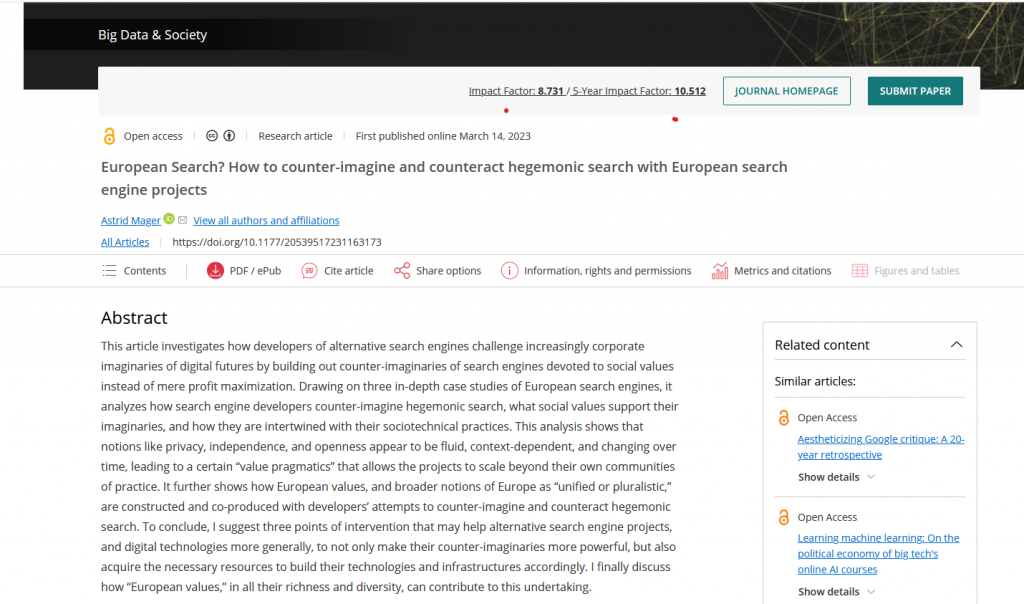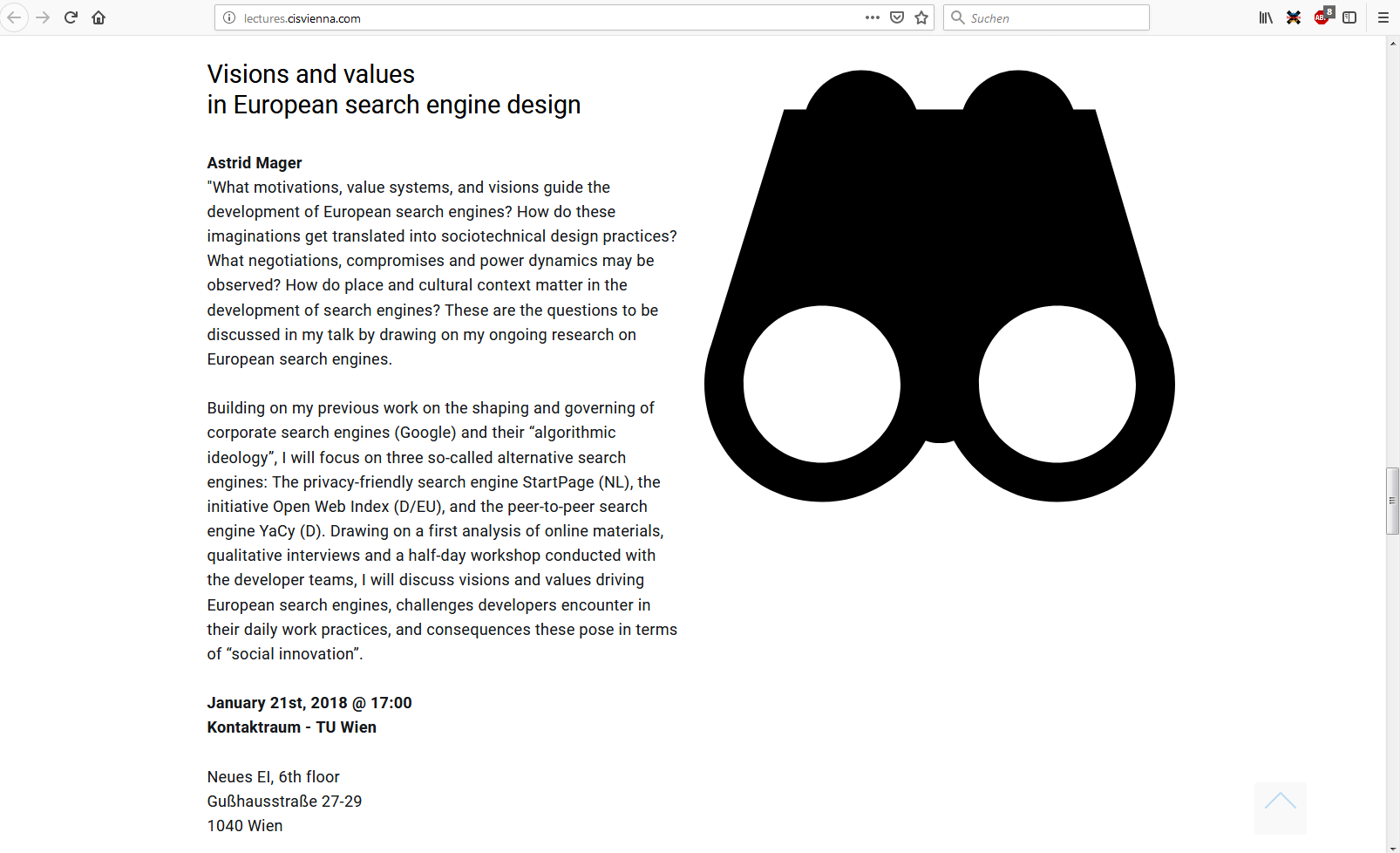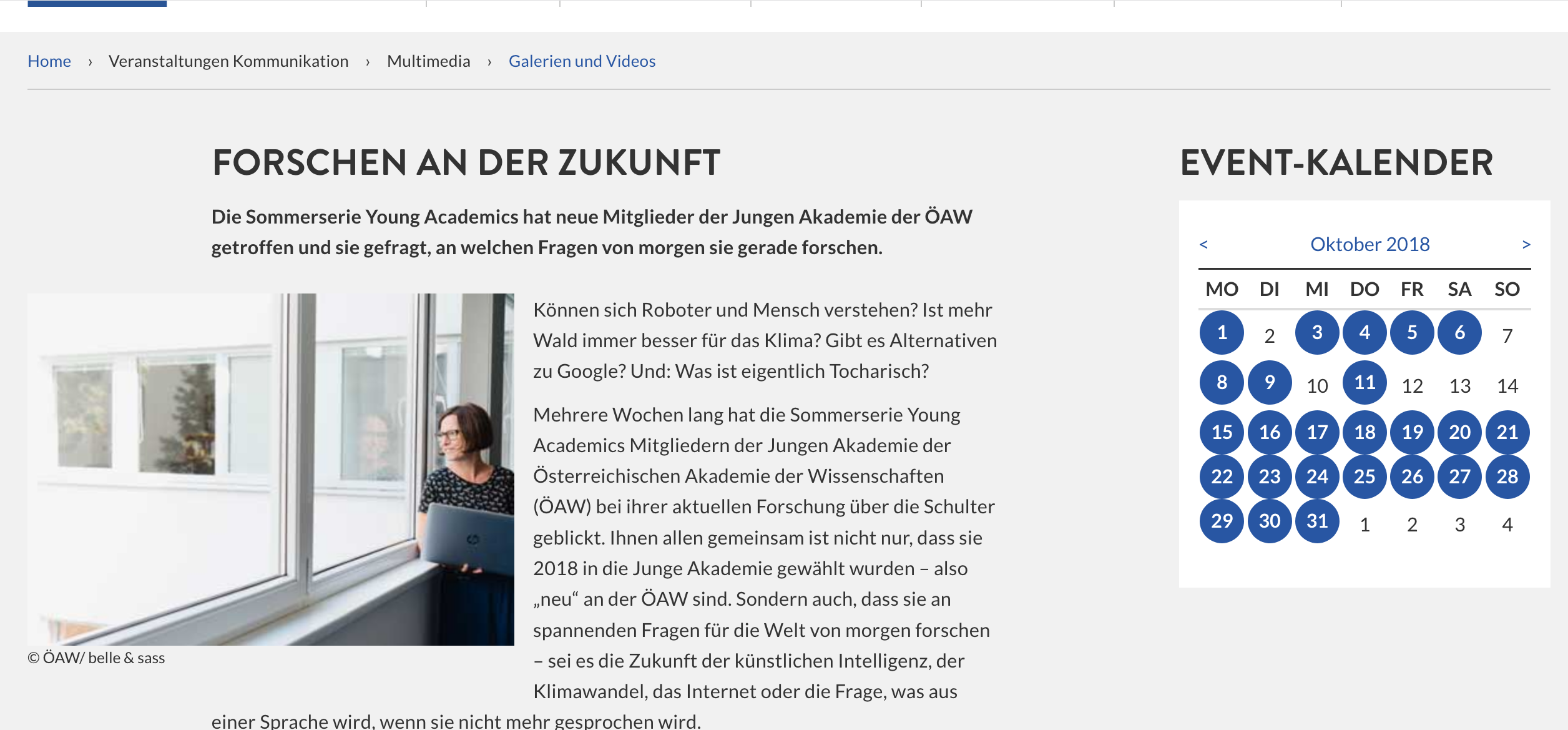I’m very happy that my BD&S special issue article is online now! 🙂 It’s called “European Search? How to counter-imagine and counteract hegemonic search with European search engine projects” – it was a bit of a tough nut since critiquing big tech and their sociotechnical imaginaries appears to be much easier than thinking about (and realizing!) alternative technologies and their counter-imaginaries. And that’s exactly why we need to shift our attention from dominant, often corporate imaginaries towards alternative tech and their counter-imaginaries of digital futures – especially in the European context where notions of value-based Europe are strongly pushed in EU policy rhetoric, but remain empty catchphrases often times. To sum up, I’m proud that this article is out now & I would love to hear what you guys think about it!!
Tag Archives: privacy
lecture @ technical university of vienna
In January I was kindly invited to give a lecture on my habilitation project “Algorithmic Imaginaries“. This talk was part of the lecture series “Aspects of the Digital Transformation” at the The Centre for Informatics and Society (CIS) of the Faculty of Informatics. Thanks a lot to Florian Cech and Hilda Tellioglu for the warm welcome including fine wine and bread! Thanks also to the audience who triggered really interesting discussions! You can find the video on the C!S website if you want to watch it (in English):
Suchmaschinen in Europa – europäische Suchmaschinen?
I was invited to write a blog post about my research for the Young Academy blog at the daily newspaper “Der Standard“. Here’s the teaser:
Suchmaschinen in Europa – europäische Suchmaschinen?
Suchmaschinen sind gesellschaftspolitischen Entwicklungen unterworfen. Doch welche Rolle spielt Europa dabei?
Enjoy reading the the full text here (in German)!
If you want to learn more about all the great members of the Young Academy, check out the summer series portraits of new YA members. Mine is titled “Kleine Davids gegen Google Goliath“. It’s a fine compilation of interdisciplinary research my young colleagues are doing.
“netzpolitischer abend”
 Genau vier Wochen nach dem letzten Netzpolitischen Abend AT gibt es am ersten Donnerstag im Monat, konkret dem 2. März, wieder drei spannende Vorträge zu netzpolitischen Themen – wie üblich ab 19:30 Uhr im Wiener Metalab in der Rathausstr. 6:
Genau vier Wochen nach dem letzten Netzpolitischen Abend AT gibt es am ersten Donnerstag im Monat, konkret dem 2. März, wieder drei spannende Vorträge zu netzpolitischen Themen – wie üblich ab 19:30 Uhr im Wiener Metalab in der Rathausstr. 6:
- Astrid Mager (Institut für Technikfolgenabschätzung, @astridmager): Suchmaschinen in Europa. Europäische Suchmaschinen?
- Maximilian Schubert (@ISPA_at): „Netzsperren in Österreich“
- Wolfie Christl (@WolfieChristl): Big-Data-Business, Profiling & Privacy
 Und hier der Link zum Nachsehen und Nachhören. Danke an alle, va Herbert Gnauer (von Idealism Prevails) für’s streamen & schneiden, war sehr fein!!
Und hier der Link zum Nachsehen und Nachhören. Danke an alle, va Herbert Gnauer (von Idealism Prevails) für’s streamen & schneiden, war sehr fein!!
“Glocal Search” done :)
My project “Glocal Search. Search technology at the intersection of global capitalism and local socio-political cultures” is finished. YAY. The project was funded by the Anniversary Fund of the Austrian National Bank (OeNB, project number 14702) and carried out at the Institute of Technology Assessment (ITA). It started in March 2012 and ended in September 2015. Its main research question was to investigate how search technology is shaped and governed at the intersection of global and local dynamics. During the project I decided to take the reform of the EU data protection legislation as a case study.
 Due to large-scale political events, the NSA affair most importantly, the European Union started to get active, to try to unify its data protection legislation and to develop common data protection standards – why the empowerment rhetoric does not easily translate into political practice and where the problems lie turned out to be a central part of my analysis.
Due to large-scale political events, the NSA affair most importantly, the European Union started to get active, to try to unify its data protection legislation and to develop common data protection standards – why the empowerment rhetoric does not easily translate into political practice and where the problems lie turned out to be a central part of my analysis.
A short summary of the project can be found below. The final report can be downloaded here. A couple of publications related to the project can be found in the publication list. Two more publications are currently under review with Social Studies of Science and Science, Technology & Human Values. A follow-up project has been submitted to the Austrian Science Fund (FWF) and will hopefully be funded! This project would enable me to draw together and cross-analyze results from my past, present, and future work to develop “algorithmic imaginaries” driving the development and governance of search engines in global, European, and local contexts. This analysis is supposed to result in a habilitation and a peer-reviewed book. Given the current funding situation in Austria though I have to KEEP MY FINGERS CROSSED!!!
Project summary:
The search engine Google has a market share of more than 90 per cent in most European countries. It is developed in Silicon Valley and thus grows out of a very specific economic and innovative culture which has been coined ‘Californian Ideology’. This label stands for the combination of the free-wheeling spirit of the hippies and the entrepreneurial zeal of the yuppies. The result of this combination is a search engine which conquered large parts of the world because of its state-of-the-art search algorithm, but also because of its clever business model.
Google transforms personal data into user profiles which are used to display personalized advertising. These profiles are fed with data from different Google services – ranging from simple web searches to map services, or social media to ‘intelligent’ artefacts such as Google Glass. Especially since Snowden’s revelations, these business practices have been discussed critically. In Europe, Google is confronted with a number of accusations including the abuse of its quasi-monopoly, data protection violations and collaborations with secret services.
In the course of this growing criticism, the European Union announced a comprehensive data protection reform. In January 2012, the first draft of the ‘general data protection regulation’ was presented. It is supposed to be directly binding for all member states. The main goal of the data protection reform is to force Google & Co. to respect European values and legislations – e.g. with regulations regarding the explicit consent to data transfer, penalties of up to 5 per cent of annual turnover in case of violations of the law, as well as common law enforcement with coordinated data protection authorities. At the same time, the European Court of Justice (ECJ) passed a remarkable judgement with the ‘right to be forgotten’: Based on the current EU Data Protection Directive, the ECJ is forcing Google to delete from its index illegitimate content relating to a person if requested by the individual. In contrast to the EJC, however, not all member states equally support strict data protection standards. In fact, Austria is one of the few European member states that try to hold on to its strict data protection standards and persistently fight for strong data protection standards both in the European Parliament and the Council of Ministers
In view of these developments, the project ‘Glocal Search’ posed the following research questions: How are search engines imagined in Europe and how is Europe imagined in the context of search engines? What visions and values guide European search engine politics and how are they translated into political practice? How does the European imaginary play out in the Austrian context and how do national disparities contribute to the making and unmaking of Europe? What actors, interests, and strategies are central in negotiations of the EU data protection reform? And what role does Austria play in European search engine politics? To answer these questions, discourse analyses of European policy documents and Austrian media as well as 18 qualitative interviews with experts were conducted. Theoretically, concepts from critical Internet research, critical theory, and science and technology studies were used.
Results
To theorize globally operating search engines and their relation to the information economy I extended my previous work on “algorithmic ideology” by drawing on concepts from critical theory. I argued that corporate search engines clearly contribute to materializing and fostering capitalist principles. Even though alternative search engines like DuckDuckGo aim at providing users with different styles of search, the capitalist ideology appears to be hegemonic since not all ideologies are equal in terms of exercising their power. With the globalization of search technologies, Google most importantly, not only technical tools, but also societal norms, values and ideas are globalized that are increasingly at odds with local visions and value-structures. To grasp tensions between globally operating technologies and local sociopolitical cultures I used the EU data protection reform as a case study and the concept of “sociotechnical imaginary” (Jasanoff and Kim 2009) to investigate how search engines and Europe are co-produced and what role Austria can play in European search engine politics.
The empirical analysis of EU policy documents clearly showed the emergence of a European search engine imaginary over the past years – a vision in which fundamental rights such as the right to privacy, data protection and informational self-determination represent key aspects of the European identity. At first, policy documents adopted the US-American rhetoric of internet technologies as driver of economic growth. In view of recent developments, however, they now increasingly describe Google and Co. as intruders in our privacy and as a threat to human rights. The data protection reform is being framed as a central tool to commit North American IT companies to protecting European visions and values.
A glance at the Austrian media enables us to see how fragile the European identity is when it comes to data protection. Following initial euphoria regarding the data protection reform, conflicts of interest soon came to the fore. The ‘battle’ (Falter 28/13) or ‘fight’ (Österreich 09/2012) is fought on multiple ‘fronts’ (Presse 10/2013). On the one hand, the media constructs a ‘divide’ (Presse 01/2011) between the USA and Europe – in this context Europe is described as consistently fundamental rights-friendly. On the other hand, the media discusses inner-European conflicts where practical negotiations of the data protection reform are concerned. Austria, as a data protection-friendly country, is being seen as differing from countries such as Ireland and Great Britain. The latter interpret a strong data protection law as a threat to their economic success. As a result, politics and the media deploy a rhetoric of empowerment when Europe addresses other countries (the USA). Nevertheless, this rhetoric disintegrates in a choir of very different voices and viewpoints when Europe is confronted with itself.
Interviews with experts finally showed that search engine policy has largely moved on from traditional policy-making. Search engine politics clearly mirrors the shift from government to governance, as it is described in the literature. The majority of interview partners describe particularly US-American lobby organizations, but also civil society groups as central actors in the negotiations of the data protection reform. They all employ different strategies to inscribe their interests in the general data protection regulation, but their resources and possibilities are distributed very unequally. Moreover, companies such as Google ‘actually set data protection standards’, as one interviewee put it. This shows that European search engine politics not only reflects geopolitical power relations, but also hegemonic forces that go far beyond Europe’s borders.
Europa gegen Google & Co?
Mein Projekt “Glocal Search” (OeNB) neigt sich bald dem Ende zu. Deshalb wird es am 23. April 2015 eine Abschlussveranstaltung zum Thema Suchmaschinenpolitik, europäische Visionen und Werte, sowie Interessenskonflikte geben (in a nutshell). Die Veranstaltung wird am 23.4.2015 um 18h an der ÖAW stattfinden. Hier der Einladungstext von der ITA Website:
 Heißt es Europa gegen Google & Co? Oder lassen sich Suchmaschinen regulieren? Technikforscherin Astrid Mager vom ITA diskutiert ihre Forschungsergebnisse mit VertreterInnen aus Daten- und Konsumentenschutz und von Internet Service Providern.
Heißt es Europa gegen Google & Co? Oder lassen sich Suchmaschinen regulieren? Technikforscherin Astrid Mager vom ITA diskutiert ihre Forschungsergebnisse mit VertreterInnen aus Daten- und Konsumentenschutz und von Internet Service Providern.
Google sieht sich insbesondere in Europa mit Vorwürfen konfrontiert, die vom Missbrauch des Quasi-Monopols bis hin zur Zusammenarbeit mit Geheimdiensten reichen. In der Debatte werden das Recht auf Privatsphäre, Datenschutz und informationelle Selbstbestimmung als zentrale Elemente der europäischen Identität ins Feld geführt – und deren Verletzung kritisch diskutiert.
Astrid Mager vom ÖAW-Institut für Technikfolgen-Abschätzung (ITA) hat sich in ihrem Forschungsprojekt „Glokale Suche“ mit Visionen und Werten europäischer Suchmaschinenpolitik, deren (schwieriger) Übersetzung in politisches Handeln, sowie deren Verhältnis zu österreichischen Diskursen beschäftigt. Bei der Präsentation der Ergebnisse und der anschließenden Diskussion wird es darum gehen, wie es Europa gelingen könnte, seinen Wertekanon in die Praxis zu übersetzen; wie global agierende Suchmaschinen reguliert werden können und welche Rolle Österreich in der europäischen Suchmaschinenpolitik spielt.
DiskussionsteilnehmerInnen:
Astrid Mager, Institut für Technikfolgen-Abschätzung (ITA)
Andreas Krisch, European Digital Rights (EDRi), Verein für Internetbenutzer Österreich (VIBE)
Gerhard Kunnert, BKA, Abt. V/7, österr. Vertreter in der EU-Ratsarbeitsgruppe Datenschutz-Grundverordnung
Maximilian Schubert, Internet Service Providers Austria (ISPA)
Daniela Zimmer, Konsumentenpolitische Abteilung, AK Wien
Moderation: Walter Peissl, Institut für Technikfolgen-Abschätzung (ITA)
Infos:
Termin: 23. April 2015, 18 Uhr, anschließend Gedankenaustausch und Buffet
Ort: Österreichische Akademie der Wissenschaften – Clubraum
Dr. Ignaz Seipel-Platz 2, 1010 Wien
Anmeldung bitte über die ITA Website (ganz unten). Danke!
ICTs and power relations
Together with my ITA colleagues Doris Allhutter and Stefan Strauss I put together a panel for the “THE INFORMATION SOCIETY AT THE CROSSROADS” conference that will take place in Vienna next year (3-7 June). The title of our panel is ICTs and power relations. Present dilemmas & future perspectives. The deadline is 27th of February.
I hope to see you there! Here’s the abstract:
The increasing presence of ICTs in a multitude of societal contexts alters the relation between social, political, technical, legal, economic arenas. As cross-sectional technologies, ICTs enter and link different societal domains often entailing a number of tensions and controversies, e.g. due to conflicting interests, hegemonic discourses, socio-political cultures and practices. Novel forms of interactions are accompanied by increasing complexity, diversity and overlaps between public and private spheres. The capacity of ICTs as a political tool is multidimensional: it can boost civil society participation (e.g. the Arab Spring) as well as amplify mass surveillance and privacy intrusion (e.g. revealed by Snowden).
This panel is interested in the manifold interplay between societal power structures and ICTs. In line with the umbrella issue “at the crossroads” particular focus lies on contributions that present controversies, dilemmas, and imaginary futures that open up paths towards socio-technical alternatives.
Target groups
The panel embraces different scientific disciplines and welcomes theoretical as well as empirical contributions bridging different perspectives (e.g. computing and philosophy, technology assessment and science and technology studies, social, political, economic and techno science).
Subjects and scope
Topics of interest thus include but are not limited to:
- Values in design and responsible technology innovation
- Socio-technical alternatives (e.g. peer production, commons, free software, etc.)
- ICT-related political participation, activism and policy making
- Norms, standards and hegemonies in ICT infrastructures, software, algorithms and code
- ICT commercialization and ideologies
- ICT at the intersection of global, European and local contexts
- Co-emergence of ICTs with gender, sex, age, class, race, dis/ability (social sorting, standardization, etc.)
- Emerging privacy and security challenges (privacy-by-design, encryption, EU data protection reform, etc.)
- Technical and regulatory oversight and limits of surveillance technologies and practices
Important Dates
Submission deadline: 27 February 2015
Notification of acceptance: 20 March 2015
momentum13. technology & regulation
Last week I had the pleasure to take part in the Momentum13 symposium. Momentum is a conference series that aims at bridging the gap between the sciences and politics. Initiated by the EU politician Josef Weidenholzer and Barbara Blaha its main purpose is to integrate critical research, leftwing politics and practical experience to think about issues such as “progress”, the motto of this year’s conference. The 3-day event was organized in tracks focussing on various topics including gender equality, social movements, arts & culture, the future of work and politics, and technology & regulation – the track I moderated together with fukami; partly on a huge terrace by the lake with a decent glass of wine.. thanks for that! 🙂
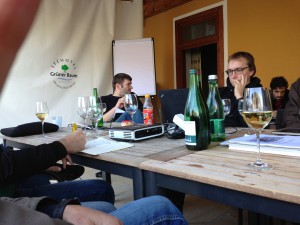 In our track we had heated debates on small technical details such as internet ports and exploit regulations and big societal questions relating to privacy, democracy and the future of the internet. But these two aspects, of course, closely relate to one another. Seemingly small technical decisions on the legitimacy or illegitimacy of a particular piece of code have largescale political consequences in terms of IT security and the stability of infrastructure we’re using day by day. And vice versa, broad societal developments and power relations influence the construction of information technology and the way the internet looks today. In a capitalist age for-profit companies like Google, for example, figure as central driving force in terms of technology development. The integration of more and more services in the web browser, for example, results in a black-boxing of technology. The less you understand your tools, the more dependent you are on their creators. Or, as fukami put it: “If you can’t break it, you don’t own it”.
In our track we had heated debates on small technical details such as internet ports and exploit regulations and big societal questions relating to privacy, democracy and the future of the internet. But these two aspects, of course, closely relate to one another. Seemingly small technical decisions on the legitimacy or illegitimacy of a particular piece of code have largescale political consequences in terms of IT security and the stability of infrastructure we’re using day by day. And vice versa, broad societal developments and power relations influence the construction of information technology and the way the internet looks today. In a capitalist age for-profit companies like Google, for example, figure as central driving force in terms of technology development. The integration of more and more services in the web browser, for example, results in a black-boxing of technology. The less you understand your tools, the more dependent you are on their creators. Or, as fukami put it: “If you can’t break it, you don’t own it”.
This, however, causes a couple of questions: Do we all need to learn programming to use the computer? (or how else would we be able to “break it”?) Or isn’t it the role of politics and law to set limits where limits are needed (e.g. data protection and the exploitation of user data by big US-American companies) and to protect us from harmful technology? Or is that an illusion in post 9/11 societies where extensive surveillance has become a central interest not only of companies, but also of nation states around the globe? And what can we do about all that? How can we regulate Google, Facebook, Twitter and other tech companies that increasingly shape our information universe, social relations, and political discourses, as we’ve seen in our track in presentations on Twitter politics and data journalism? What role can technology funding play in regard to the steering of information technology? How can we make legal practices more transparent or measure – and promote – open data strategies; or “open everything”? What kind of copyright is feasible in times of file-sharing platforms and how can data protection be secured in companies aiming at full-scale observation of employees? How can we manage risks? Those types of questions were discussed in our track. However, those are also the types of questions that future decision-making processes in the field of technology and society will be concerned with. Negotiations of the new EU data protection law, for example, will serve as an interesting test case for future technology development and socio-political agendas. How this negotiation process will end remains to be seen. That both lobbying on parts of internet businesses and the NSA scandal will be crucially influencing the reform process seems to be clear by now. Or, to cite fukami again, “we should thank Snowden” since his leaks have not only shaken up civil society, but EU policymakers too (hopefully!).
Our track discussions were accompanied by good food and great evening events, such as the keynote by Robert Pfaller or the book-reading by Kathrin Passig. Unfortunately, I missed the huge party that took place Saturday night and the Sunday evening matinee. But I’m sure that was fun too! Next year’s conference will be focused on “emancipation”. I highly recommend going there! (and not only because of the scenic location). More information can be found on the Momentum website (including info on the journals Momentum Quarterly and Momentum Policy Paper).
become a data dealer
This is a great project! The online game DATA DEALER playfully deals with practices of user profiling, sellout of private data, privacy violations etc companies like Google, Facebook, and other for-profit IT companies raise with their advertising-based business models. In the article Algorithmic Ideology I’ve shwon that the power of search engines (and social media platforms, &&&) is enacted and stabilized in a complex network of actors and social practices. I’ve argued that it’s not enough to blame Google (and other companies) for making profit and having gained a quasi-monopolist position on the internet . Rather, it’s important to understand how various actors including programmers and advertisers, but also policy makers, journalists, jurists – and last but not least – users help to stabilize its powerful role by simply using their services and contributing their data to the sophisticated caplitalist accumulation cycle. Accordingly, critically examining and debating business models and practices of Google, Facebook & co is a valuable first step on the long road towards a better understanding of new media services and, ultimately, a change of existing and future practices, products and privacy settings. The reform of the EU data protection law, for example, is a long and tough negotiation process! Playing, supporting, and sharing DATA DEALER, on the contrary, is a quick move enabling us to think about and raise awareness on the matter. And it is fun too!
If you wanna join the undertaking, go to their website, watch their video trailer, install the demo version or donate money. They’ve managed to raise $50 000 via crowdfunding just recently. I’m sure they’ll manage to create an awesome – non-profit (!) – online game! Good luck!!!
europe vs facebook/ Ö1: 10.02.; 22:30pm
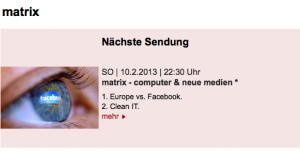 Here’s the link to the upcoming radio broadcast dealing with the student initiative “europe vs facebook”. Since I gave an interview for the program, along with other “experts”, the broadcast will most likely contain one or two of my sentences 🙂 It will go on air on Sunday, 10.02., at 22:30 pm; radio station Ö1. Or, alternatively, you could also follow the program online. I’m not sure if there’ll be a podcast available right after, but if so I’ll post the link. You’ll find more information on the program here.
Here’s the link to the upcoming radio broadcast dealing with the student initiative “europe vs facebook”. Since I gave an interview for the program, along with other “experts”, the broadcast will most likely contain one or two of my sentences 🙂 It will go on air on Sunday, 10.02., at 22:30 pm; radio station Ö1. Or, alternatively, you could also follow the program online. I’m not sure if there’ll be a podcast available right after, but if so I’ll post the link. You’ll find more information on the program here.

